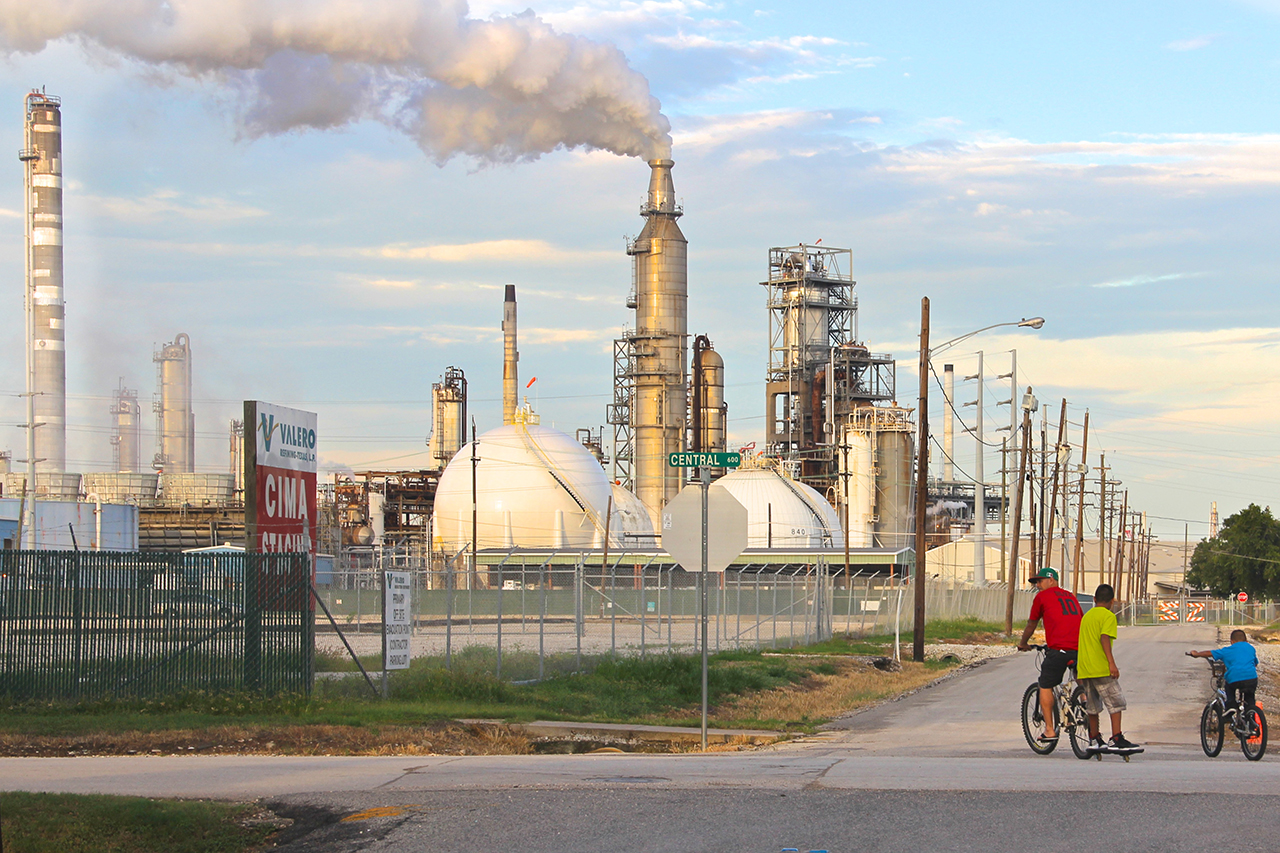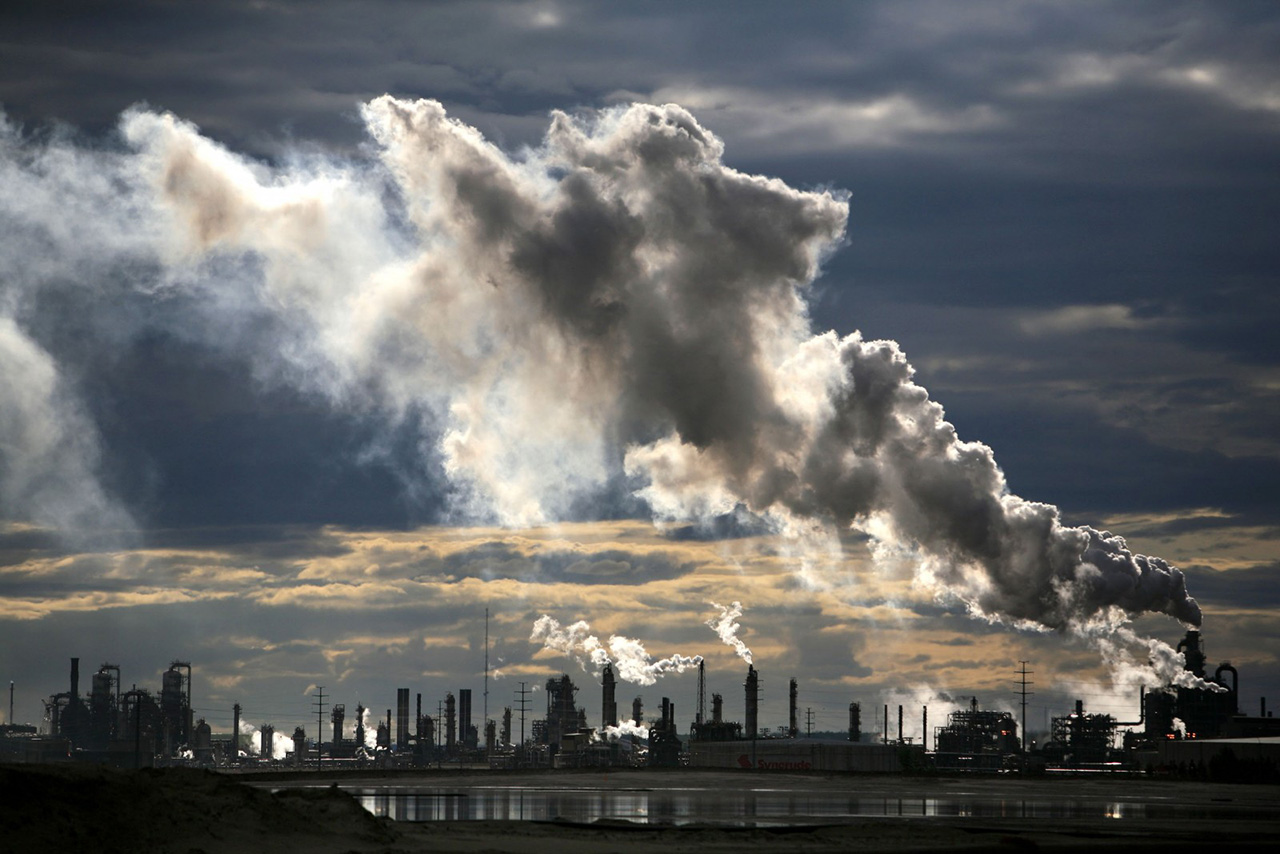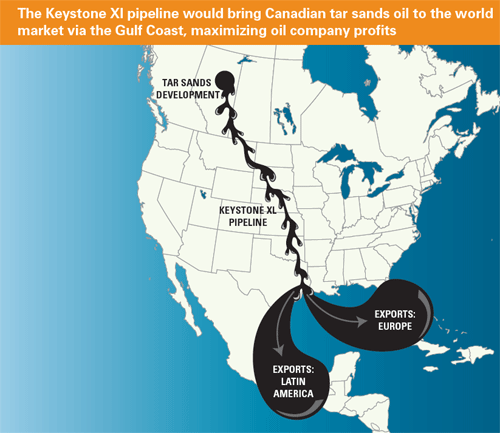“My son died from cancer. He was only 26,” he said as his eyes quivered and filled with tears.
I struggled to complete the community health survey that brought me to this man’s humble front porch, which was next door to a menacing, industrial car-crushing facility. This summer, as I knocked on dozens of his neighbor’s doors I heard similar heart-breaking stories of illness, asthma, and poverty.
One long-time resident I spoke with summed up the popular sentiment for relocation: “I’m just trying to save up enough money to move my family the hell out of here.”
These are just a few of the voices from the “End of the Line” – those living in the community of Manchester, on Houston’s toxic East End – one of the communities at the terminus of the Keystone XL tar sands pipeline.
Last weekend thousands gathered in over 200 actions across the country for a national day of action to “Draw the Line” on Keystone XL and tar sands. It seems like an appropriate moment to reflect on these stories and ask: Can our climate justice and other movements better support these communities already bearing the disproportionate burden of tar sands refining and environmental injustice?
The People at Both Ends of the Pipeline
The story of tar sands resistance goes far back beyond Barack Obama, long before 1,253 folks like myself were arrested at the White House for protesting the pipeline, or really even before Keystone XL was anything but an industry pipe dream. Decades ago the struggle began by First Nations leaders in modern-day Canada and their commitment to maintain their ancestral homelands from what they term the “slow industrial genocide” of tar sands extraction that is poisoning their loved ones and turning their boreal paradise into a tortured wasteland.
What do the communities living with the worst impacts at both ends of this pipeline have in common? They are both communities of color.
In the spring of 2012 when President Obama fast-tracked the southern segment of Keystone XL from Cushing, Oklahoma to the Gulf Coast he sent a clear message that these communities are industrial sacrifice zones. After an epic year of direct action resistance from Tar Sands Blockade in Texas and Great Plains Tar Sands Resistance in Oklahoma, the construction of KXL South is nearing completion and would pump up to 590,000 additional barrels of toxic tar sands to be refined in fence-line communities in Houston and Port Arthur, Texas.
Life at the “End of the Line”This part of the Gulf Coast has more refineries and petrochemical complexes than anywhere on the planet. The communities along the fence-lines of these facilities – many of which grossly violate air quality regulations on a daily basis without ever facing meaningful repercussions – breathe some of the deadliest air in North America.
It comes as no surprise that these are mostly low-income, communities of color: majority Latina/o on the East End of Houston and majority African-American in Port Arthur. “The neighborhood of Manchester and other neighborhoods within the East End of Houston are living examples of environmental racism,” says life-long East End resident and community activist, María Jiménez.
What would 500,000 additional barrels a day of tar sands from KXL South mean for the health of these communities? The best way to visualize how such an increase in toxins might impact community health is to examine the current reality. Children living within two miles of the Houston Ship Channel are 56 percent more likely to get leukemia than those living ten or more miles away. “Asthma attacks, constant headaches, nosebleeds, rashes, and eczema,” are daily realities for residents, as described by Bryan Parras, an East End activist with Texas Environmental Justice Advocacy Services (TEJAS). “When you live near these facilities you’re being exposed to dozens of chemicals daily.” Eight of these chemicals are known carcinogens.
Another Manchester resident María Nieto, speaks to her own experience; “One simply cannot breathe. You’ll always wake up in the middle of the night with a dry throat, dry nose, and burning eyes.”
The daily reality of life amidst massive petrochemical complexes goes beyond just the ever-present threat of chronic disease. Eighteen-wheeler trucks clog neighborhood streets en route to the facilities, damaging roads and increasing the risk of accidents. Massive toxic flares bring strange smells and are so bright than some people need to block their windows to sleep at night. Noise from rail yards, highways, and facilities is ubiquitous, inescapable.
Parras explains how these grave injustices are allowed to continue: “The City of Houston hasn’t been able to meet EPA standards since the agency was first created. These facilities are grandfathered [into the regulations] and that’s why the tar sands come down here because they can handle this dirty, heavy stuff.”
Environmental injustice is just one strand of the interlocking web of poverty, discriminatory immigration policies, and constant police harassment, which foster a mentality of normalized oppression in residents. “Normalized oppression,” explains Parras, “is when oppression becomes a normal state of being and you don’t even realize that other folks in other parts don’t have these same problems.”
Organizing and Community Resistance
Despite this intense internalized oppression and the seemingly insurmountable might of industry, community-based environmental justice organizations like TEJAS continue to organize for the health of residents. This summer they organized dozens of volunteers, like myself, to go door-to-door and collect health surveys to better document the community health impacts. Most residents said that pollution was so bad that they would re-locate their families if they could receive fair compensation. These results will be released next week in a comprehensive health report from communities living along the entire Houston Ship Channel.
In July, TEJAS also organized the Healthy Manchester Community Festival. A festival that brought out the community for an evening of free music, food, and cultural activities to help build community and give people the courage to start demanding the right to know what their being forced to breathe. The festival included informational booths on the chemical contents of the neighborhood’s air and free asthma screenings for children.
Drawing the Line on Environmental RacismOur campaigns to halt the destructive tar sands industry once and for all goes far beyond this single pipeline. Our movement will only succeed when it makes real changes in the lives of real people. And it begins with each of us. It means listening and acting in solidarity of those most impacted on the front lines of tar sands extraction, transportation, and refining. As a privileged white guy I personally still have a lot more to learn from these community leaders and my experience this summer listening to their stories is just the beginning of my path to create a sustainable world that works for everyone.
Again María Jiménez says it best: “There is a need for people living in communities like ours to be able to breathe quality air, drink quality water, and to have peace of mind with respect to the environment. We must join in the struggle with people worldwide for an earth that can sustain communities, and allow us to grow to our full human potential, not just one determined by others that have imposed these inequalities upon us.”
Ethan Nuss is a volunteer with Texas Environmental Justice Advocacy Services.
3 WAYS TO SHOW YOUR SUPPORT
- Log in to post comments



















